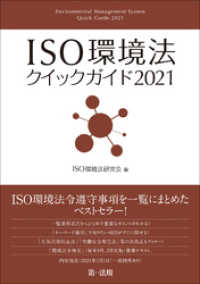Full Description
Linguistic Choices in the Contemporary City focuses on how individuals navigate conversation in highly diversified contexts and provides a broad overview of state of the art research in urban sociolinguistics across the globe. Bearing in mind the impact of international travel and migration, the book accounts for the shifting contemporary studies to the workings of language choices in places where people with many different backgrounds meet and exchange ideas. It specifically addresses how people handle language use challenges in a broad range of settings to present themselves positively and meet their information and identity goals.
While a speaker's experience runs like a thread through this volume, the linguistic, cultural and situational focus is as broad as possible. It runs from the language choices of Chinese immigrants to Beijing and Finnish immigrants to Japan to the use of the local lingua franca by motor taxi drivers in Ngaoundéré, Cameroon, and how Hungarian students in their dorm rooms express views on political correctness uninhibitedly. As it turns out, language play, improvisation, humour, lies, as well as highly marked subconscious pronunciation choices, are natural parts of the discourses, and this volume provides numerous and extensive examples of these techniques. For each of the settings discussed, the perspective is taken of personalised linguistic and extra-linguistic styles in tackling communicative challenges. This way, a picture is drawn of how postmodern individuals in extremely different cultural and situational circumstances turn out to have strikingly similar human behaviours and intentions.
Linguistic Choices in the Contemporary City is of interest to all those who follow theoretical and methodological developments in this field. It will be of use for upper level students in the fields of Sociolinguistics, Pragmatics, Linguistic Anthropology and related fields in which urban communicative settings are the focus.
Contents
List of Tables
List of Figures
List of Contributors
1. Introducing city people and their communicative challenges
Part I. Innovative language uses
2. Marginal spaces in small urban areas: Evidence from a refugee centre in Southern Italy
3. Urban Language Practices Online? Multilingualism among German-Namibians in Computer-Mediated Communication
4. Motorcycle taxi drivers in Ngaoundéré, Cameroon: Communication in a diffuse multilingual setting.
Part II. Competing identities
5. Language Choices and Language Identities of Finns in Japan
6. PC goes East-Central Europe: Enregistering politically correct language in Budapest university dormitories
7. The Haarlem Legend: The unpredictable formation of a national language norm
8. The sociolinguistic situation in Hradec Králové, the best researched town in the Czech Republic
Part III. Multilingual strategies
9. The social linguistic soundscape and its influence on language choice in Stornoway
10. Bilingualism, ideology and identity: Change in the Finland-Swedish variety
11. Trasyanka as a dying phenomenon of urban speech in the city of Minsk
12. Language problems in interactions between locals and foreign tourists in the city of Prague: A language management study
Part IV. Linguistic Landscapes
13. 'Non-identical twins': monolingual bias and linguistic landscapes of the twin cities of Ivangorod/Narva
14. 'Nothing personal, just business': individuals as actors in changing monolingual linguistic landscapes in Vyborg, Russia
15. Behind the linguistic landscape: An interview-based study of business owners' reasons for choosing business names in the German city of Mainz
Part V. Global processes and sound change
16. Rhotics Frequency In Beijing
17. Reacting to urbanization in Morocco: New language practices, old discourses?
18. The dynamic sociophonetics of Bulgarian /l/: The quiet transition from [l] to [ŭ]
Index








